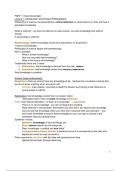Summary
Summary of the third year course "Philosophy of Science"
- Course
- Institution
- Book
In-depth summary of both parts of the course Philosophy of Science. Includes full summary of the lectures, slides, tutorials and the second book (Critical and Scientific thinking by Michael Vlerick)
[Show more]




